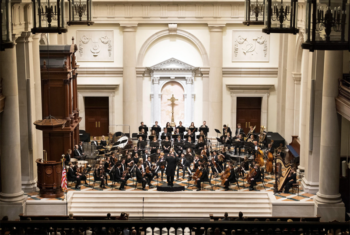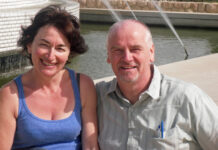By Larry P. Arnn, Hillsdale College —

On Saturday, our chamber ensembles performed in our Christ Chapel. A week earlier the Chapel chorus performed Evensong. These events and many like them resounded in that magnificent structure, a blessing to us all designed by the splendid architect Duncan Stroik. They are the product of skill and work cultivated for years and decades. In that work, the students and teachers continue a line as long as civilization.
Christ Chapel and most of the music played in it are “beautiful.” Beauty is one of the “three transcendentals.” A noble tradition says they are the highest objects of study and apprehension. The word beauty is cognate with “beatitude,” meaning supreme happiness, or in the Christian faith, meaning the experience of seeing God, the perfect Being.
Is beauty in the eye of the beholder? Many have always thought so. Today probably most do—except, that is, when they see it. Then it captivates the eye and, in the same instant, the soul.
Everyone has the experience of beauty. He sees something so fine that it calls a halt to other sensing and thinking. Did you ever walk into Yosemite Valley? If not, go do it. If your eyes are not clouded by some intrusive dogma, you will see that this is no ordinary scene. Have you listened to the “Sanctus” movement in Faure’s Requiem, in which the voices swell up to heaven to sing the call of praise, “Hosanna in the highest?” The hearer who attends must think this an evidence of the divine in us.
Do not miss the evidence of beauty that can break out in popular music, except when it is corrupted by the ugliness of the age. In graduate school, I learned with a lasting friend to admire the country singer George Jones. Listen to “Still Doin’ Time” or “He Stopped Loving Her Today”—in them is heartbreak defined.
There is beauty in human acting and speaking. I have always loved the Peoria speech by Lincoln. It is not a poetic masterpiece like the Gettysburg Address or the Second Inaugural. Instead, it is a masterful exposition of the fact that we have always known the evil of slavery, except he says that a new and evil ideology has made some forget it. The speech is a narrative of events, but along the way, Lincoln stops to give one of his axiomatic proofs, as close to Euclid anyone has ever come in rhetoric. If the right to property, he argues, belongs to any man, that by itself proves that no man may rightly own another. It is curious, but reading that speech once made me burst into tears. Lincoln was arguing for the beauty of our country, and through that argument he would save it.
It is not given to mortal man to say definitely what is the most beautiful scene or music or structure or book or speech, but the real contenders are as different from the ordinary as a mountain from a molehill. My son-in-law, a Plato scholar, thinks Bernini the superior of Michelangelo. Surely not, but it is a respectable opinion for a young man. If he had said Mapplethorpe I would have ejected him. But he would not.
Today, in our zeal to conquer everything including nature and God, we lose our powers of observation. We see a child grow and learn, and we think we are making it grow and learn. We paint a picture and think we are providing the beauty to the scene. We compose music that rants and threatens and think it graceful because we—or rather I—did it. This is a failure of education that also destroys the chance of it.
Beautiful things happen here at Hillsdale College frequently. It is the reason we are here. We wish to learn to see with perceptive eyes, to hear with acute ears, to think and talk with comprehending minds—and then we can behold the beautiful. That is the experience nearest heaven on earth.



